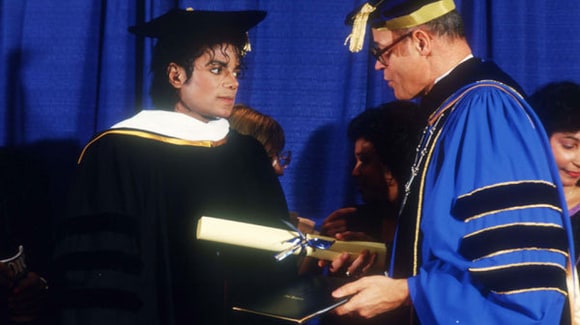Former PM John Howard is not the first to receive a controversial honorary degree
There was a big kerfuffle at Sydney University when former Prime Minister John Howard was awarded an honorary doctorate.
Some people feel that handing out doctorates to people who do not earn them devalues the degrees people do earn. In the case of John Howard, some argued that if honours are to be granted, they should be given to people with a better public record.
What is an honorary doctorate, anyway?
Honorary doctorates are just one of the many honorary degrees that universities can award, though they appear to be the one everyone likes best – possibly an honorary Bachelor of Arts (BA) seems a little shabby.
An honorary degree acknowledges someone who a university committee deems worth honouring, by offering them a special (albeit mostly symbolic) position, in the university community.
A degree that is awarded honoris causa (because Latin boosts snootiness) has never conferred the right to use the degree.
The public can rest assured that there are not medical doctors, veterinarians, accountants or lawyers plying their trade without actual qualifications.
This need for the public to trust university degrees is important. It means that it is considered a shocking faux pas to call oneself a “doctor” on the basis of an honorary doctorate. Don’t expect to see anyone refer to “Dr John Howard” anytime soon.
This does not make it impossible. A handful of honorary doctorate holders have attempted to actually use their title, including one of the Founding Fathers of the US, Benjamin Franklin, who was awarded his honorary doctorate in 1756.
When this happens, the scholarly community averts its gaze in embarrassment. That may not sound like such a terrible fate, but for the types that are awarded honorary degrees, it kind of is.
How did these come about?
Universities have been giving honorary degrees for more than 500 years.
It started out as a form of mutual patronage, offering privileges to those who might return the favour to the institution through funding or political support. As was perhaps obvious at the University of Sydney last week, this late-medieval system is pretty much still intact.
It is surprising that universities have retained this wanton display of partiality.
Historians and philosophers say that, for more than 200 years, universities have done what they could to hide their tendency to make subjective judgements in support of their own vested interests or in the interests of their class.
The belief that universities embody objectivity gives them authority in society. The idea that degrees are only awarded on the basis of merit is central to the legitimacy universities claim. Honorary degrees seem to contradict all that.
Perhaps it is for this reason that in recent years, universities have given more extensive justifications for honorary degrees.
They argue that honorary degrees acknowledge public goods of the type they also claim universities embody. The type of recipients granted honorary degrees sometimes supports this claim – but sometimes, they do not.
Who gets honorary doctorates?
Crikey has made a terrific list of people who have received honorary degrees in Australia.
The list includes a range of domestic and international political figures, some who have evidently been honoured in exchange for political or financial favour.
There are also sporting heroes, prompting a number of quips from university types wondering when one of our lot will be awarded a reciprocal Honorary Brownlow Medal.
By contrast to some of these perhaps questionable decisions, some honorary awards seem truly inspired.
At my graduation, an honorary doctorate was awarded to the violinist, Richard Tognetti. At the University of Western Australia, the honorary doctorate given to Tim Minchin was rewarded with possibly the best graduation speech in a millennium of university history.
Should this practice be discontinued?
Beliefs about honorary degrees reflect the contested ways that the university is perceived.
Those who claim that honours go against “the idea of the university” forget that there has never been just one idea of the university.
Old traditions with Latin names make it seem that the university’s values are eternal and universal, but they are not.
Those who like tradition and appreciate esteem will love the habit of giving honorary awards. People holding radically egalitarian views on merit will not.
Some who oppose Howard’s award claim that the university is for the public good and that honorary degrees should reflect this.
I share their wish that universities focus on the public good, though a thousand years of university history suggests that even when they do work for the common good, elite institutions will often look to their own vested interests first.
Honorary degrees expose all this messiness, which may be the last thing left in their favour.
•Correction: the piece incorrectly stated that Benjamin Franklin was a US president. This has been changed to “one of the Founding Fathers of the US”
Hannah Forsyth, Lecturer in History, Australian Catholic University
This article was originally published on The Conversation. Read the original article.


